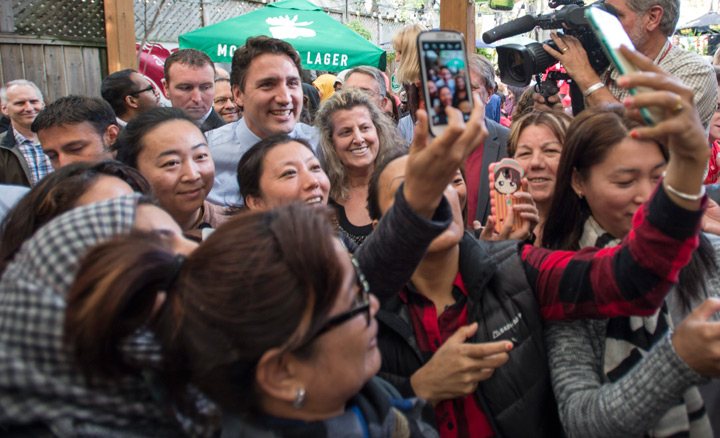The Liberal Party could be poised to win a minority government, according to seat projections from the Laurier Institute for the Study of Public Opinion and Policy.

The Liberals, who started the election in third place, have overtaken the Conservatives in seat projections, with 128 seats to the Conservatives’ 122. The NDP, once the front-runner, is trailing with 84 seats.
The seat projections are based on a weighted aggregation of 11 separate polls among 18,000 respondents between Oct. 5-11.
“The momentum has been particularly in Ontario,” said Barry Kay, Wilfrid Laurier University politics professor.
Liberal support in Canada’s most populous province has been steadily growing, though not at the expense of the Conservatives.
“What’s really happening in Ontario is the NDP vote is shifting to the Liberals while the Conservatives basically stand still.”
The Liberals are poised to win most of the seats in the GTA, Kay said. It would be a big gain: the region has 56 seats, more than the entire province of Alberta, or BC, or the entire Atlantic region.
“In Toronto for sure, they’re going to sweep,” said Kay. “I don’t think the Conservatives are going to win anything in the 416 and I think they’re going to be very limited in what they can do in the 905 area around Toronto.”
Looking at a map of the area, he said, “The ring around Toronto, not just Toronto itself, is mostly red now. That was not the case a month and a half ago.”
NDP slipping in Quebec
The NDP has continued to lose seats in Quebec, according to Kay, though they are still well in the lead with 41 to the Liberals’ 20.
“In Quebec, the NDP has started to drop in the last few weeks as well, and they’ve dropped dramatically. They’ve lost nearly a third of their vote from three or four weeks ago.’
Unlike in Ontario though, the Liberals haven’t been the only beneficiaries of the NDP slide.
- Alberta to overhaul municipal rules to include sweeping new powers, municipal political parties
- Norad looking to NATO to help detect threats over the Arctic, chief says
- Grocery code: How Ottawa has tried to get Loblaw, Walmart on board
- Military judges don’t have divided loyalties, Canada’s top court rules
“The NDP decline in Quebec is being split among the three other parties both in votes and in seats,” he said.
“The Conservatives actually are going to pick up seats in Quebec compared to the last election. It’s probably the only region where they will actually gain some seats.”
The Bloc Quebecois is back on the map too, with perhaps three seats, he said, up from none a few weeks earlier.
Western Canada
Kay says that the Prairies remain largely a Conservative lock, though the Liberals have started to make some inroads.
“The Liberals are poised to win two or three seats in Calgary, one possibly in Edmonton,” he said. He also expects a win for the party in Winnipeg. The NDP will likely pick up a few too, such as Desnethe-Missinippi-Churchill River in northern Saskatchewan and possibly some seats in Saskatoon.
BC is a different story – all three major parties stand to win a big share of the seats: 14 Conservative, 15 NDP and 12 Liberal. This would be a big change from before the election, when the Conservatives held far more BC seats than any other party, winning 21 out of 36 in 2011.
Atlantic Canada
Atlantic Canada’s a Liberal sweep, Kay said – has been throughout the campaign. The Liberals are “totally dominant” in the region, he said, and are currently projected to win 24 of 32 seats.
What it all means
The Liberals will likely win enough seats to squeak through a minority government, Kay said. But it’s too close to say for sure.
“The Conservatives could still come first,” he said. “The reason I think that probably won’t happen is because of momentum. Momentum does mean something. Public opinion moves in waves.”
Many ridings are still too close to call, such as Peterborough-Kawartha in Ontario, various ridings around Markham and Newmarket in the GTA, parts of Regina, and a few in rural BC. And with only six seats separating the Liberals and Conservatives, a Liberal victory is far from certain – but Kay still thinks it will happen.
“My hunch is that the momentum that we have seen towards the Liberals, mostly in Ontario but some other places too, unless that abates all of a sudden, the next few days will probably be even stronger for the Liberals.”
The NDP, despite its falling numbers, will still have a solid performance, he said.
“By historical standards, this is the second-best performance in their history. Twice as good as they do in most elections.”
The NDP’s 2011 performance was an “aberration” he said, but they will have a strong role to play in the next Parliament.
“The NDP will hold the balance of power. The NDP will have real influence in this next Parliament.”
He doesn’t see Conservative leader Stephen Harper being able to govern even if his party wins enough seats for a minority.
That would set the stage for power-sharing negotiations between the Liberals and NDP. Mulcair has emphasized his willingness to form a coalition government over the past several days.
“The question then becomes what kind of arrangements, what kind of compromises are going to come between the two parties?” Kay said.





Comments